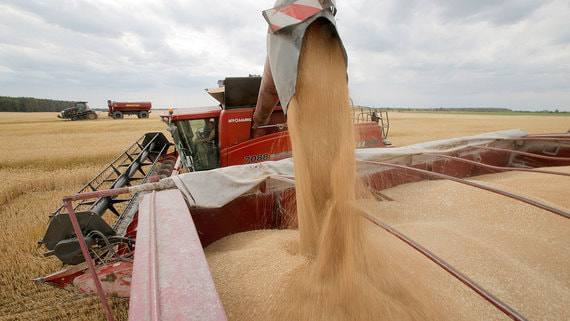The European Commission offers subsidies to Eastern Europe for the lifting of import bans from Ukraine
[ad_1]

The President of the European Commission (EC), Ursula von der Leyen, conveyed to the governments of Bulgaria, Hungary, Poland, Romania, Slovakia and the Czech Republic that Brussels is “preparing a new support package of 100 million euros” for farmers in these countries from EU funds in exchange for their governments lifting import bans Ukrainian agricultural products. In early April, 56.3 million euros were already allocated for subsidies to farmers suffering from Ukrainian imports. This was announced on April 19 by the representative of the EC Dana Spinant.
She stressed that the problem of the influence of Ukrainian grain should be resolved within the framework of the common market and the customs union, and a pan-European approach is needed here. “We will take preventive measures in accordance with EU trade rules in relation to certain categories of cereals, in particular corn, sunflower seeds and rapeseed,” Spinant said at a briefing, a video of which was published on the commission’s website. She promised that the EC “will launch an investigation into other sensitive agricultural products.” Spinant added that EC Deputy Head Valdis Dombrovskis is holding consultations on April 19 with representatives of the countries affected by the crisis – Bulgaria, Hungary, Poland, Romania and Slovakia, as well as with “Ukrainian colleagues”.
According to unconfirmed sources of Polish Radio, the EC has promised Warsaw 30 million euros in aid for its farmers – a third of the entire new package. European officials hope to finally resolve the situation at a meeting of EU agriculture ministers on April 25 in Luxembourg.
Late in the evening of April 18, following two days of negotiations in Warsaw, Ukraine and Poland agreed to unblock the transit of Ukrainian grain and other agricultural products through Polish territory. According to First Deputy Prime Minister of Ukraine Yulia Sviridenko, transit will resume on the night of April 21-22. Meanwhile, on April 19, Bulgaria imposed a ban on the import of Ukrainian agricultural products, allowing their transit, Acting Prime Minister Gylyb Donev announced. “We are forced to introduce this measure at the national level, because the European authorities are still thinking about an adequate response,” Donev said. On April 19, Hungary expanded the list of Ukrainian agricultural products prohibited for import. From the publication of the official gazette Magyar Közlöny it follows that meat, poultry, eggs, bakery products, honey, sugar, vegetables and wine were added to the grain. Suspended the import of similar Ukrainian agricultural products, with the exception of transit, and Slovakia – the ban has been in effect since April 17.
Initially, there were no indications for the supply of Ukrainian agricultural products “to starving Africa” through the EU in any European documents, says Arkady Zlochevsky, President of the Russian Grain Union. It was about free movement, access “for transit” duty-free and quota-free through the EU to the “territory of third countries” without specifying them, Zlochevsky notes. Such a green light, in his opinion, could not but interest local consumers due to low prices for Ukrainian products, Brussels’ political decision caused speculation to the detriment of local farmers, although the consequences were obvious. “Why this was allowed by the European bureaucrats and who benefited in the end is an open question,” the expert says.
According to Zlochevsky, a compromise between Brussels and the disaffected countries is already looming. The EC, according to him, threw a meager handout of 156.3 million euros to Eastern European farmers, which in fact does not compensate for the damage already incurred. “Most likely, the main result will be the approval of a pan-European regulation of free, duty-free transit of goods from Ukraine and the extension of the usual EU norms and quotas for those goods that get stuck – including them in quotas and imposing duties. Some bans on the import of Ukrainian products, which Brussels is now promising and which are being introduced by a number of countries, most likely will not last long and will not be extended,” Zlochevsky believes.
The EC is trying to resolve the situation around Ukrainian grain in such a way as to strengthen its political positions in relation to Eastern Europeans within the decision-making procedure on key economic and trade issues, said Artem Sokolov, a researcher at the Institute of International Studies at MGIMO. “So Brussels is thinking of seizing the initiative here from Poland, Hungary, and so on. This is due to the desire of the European bureaucracy to maintain control over Eastern Europe, where governments are trying and have already tried – in legal matters, as in Warsaw and Budapest – to strengthen their autonomy through conflicts, which worries the EU leadership very much,” Sokolov notes.
Vladimir Kulagin participated in the preparation of the article
[ad_2]
Source link






